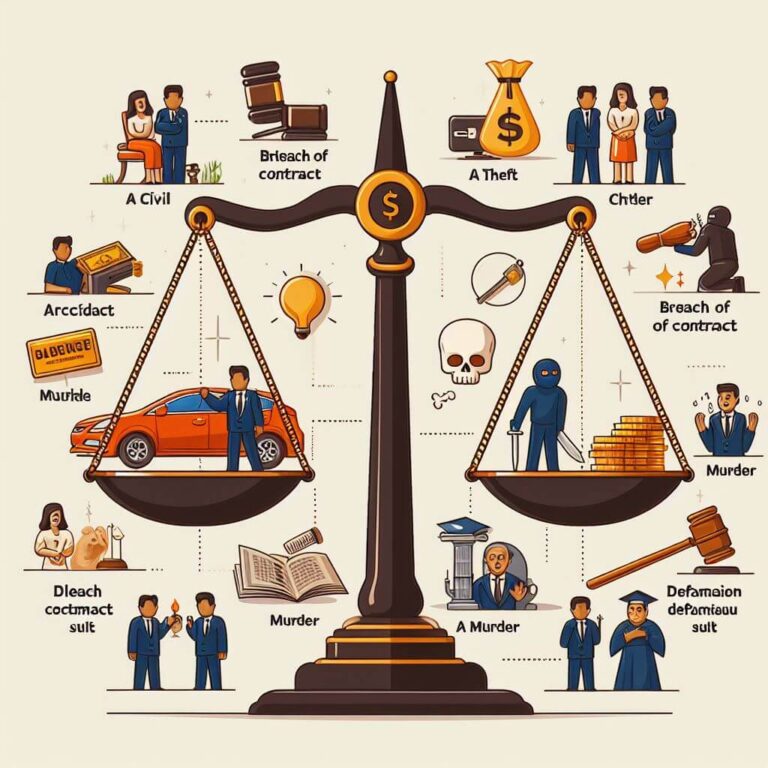In this article we have explained Understanding Offenses and Penalties under the IPC
Introduction to the Indian Penal Code (IPC)
The Indian Penal Code (IPC) is a comprehensive legal document designed to address criminal activities and prescribe penalties for various offenses. Established during the British rule in 1860, it has since been the cornerstone of criminal law in India. This guide aims to demystify the IPC’s complex structure, focusing on common offenses and their corresponding penalties.
Understanding Offenses and Penalties under the IPC: A Guide to Indian Law
Acts of Violence
Assault and Battery
The IPC considers assault and battery as criminal acts, where assault refers to the threat of violence and battery to the actual physical harm. Penalties vary based on the severity, from simple fines to imprisonment.
Murder and Homicide
Murder and homicide are among the most serious offenses. Murder involves intentional killing, attracting severe penalties, including life imprisonment or the death penalty. Culpable homicide not amounting to murder is treated slightly differently, with varied sentences based on the circumstances.
Property Crimes
Theft and Burglary
The IPC defines theft as illegally taking someone’s property and burglary as entering a property with the intent to commit an offense. These crimes carry penalties ranging from fines to several years in prison.
Fraud and Cheating
Fraudulent activities and cheating are also punishable, with the law imposing heavy fines and imprisonment on those found guilty of deceiving others for personal gain.
Sexual Offenses
Rape and Sexual Assault
Sexual offenses, including rape and sexual assault, are taken very seriously under the IPC. Convicted individuals face stringent penalties, including lengthy prison terms.
Harassment
The law also addresses harassment, including stalking and cyberbullying, prescribing fines and jail time for perpetrators.
Understanding Penalties and Legal Procedures
The IPC outlines specific penalties for each offense, ranging from minor fines to capital punishment. The severity of the penalty often depends on the nature of the crime, the perpetrator’s intent, and the impact on the victim. Legal procedures under the IPC involve filing a First Information Report (FIR), investigation by the police, and a trial in court, where both the accused and the victim present their cases.
The Role of the Judiciary and Legal Reform
India’s judiciary plays a crucial role in interpreting IPC provisions, ensuring justice is served while adapting to societal changes. Recent years have seen significant legal reforms aimed at increasing penalties for certain crimes, introducing fast-track courts, and enhancing victim protection, reflecting a commitment to evolving legal standards.
Conclusion: Navigating the IPC with Awareness
Understanding the IPC is crucial for every Indian citizen, providing knowledge on legal rights and responsibilities. Awareness of offenses and penalties can deter criminal behavior and help individuals navigate legal challenges more effectively. This guide serves as a starting point for anyone looking to understand the IPC’s role in maintaining law and order in India.
Final Thoughts
The Indian Penal Code is a foundational element of India’s legal system, outlining offenses and prescribing penalties to maintain societal order. By familiarizing oneself with its provisions, individuals can better navigate legal situations and contribute to a law-abiding society. Whether dealing with acts of violence, property crimes, or sexual offenses, the IPC offers a structured approach to justice, underscoring the importance of legal awareness in everyday life.
FAQ on Offenses and Penalties under the IPC
1. What is the Indian Penal Code (IPC)?
The IPC is a legal document that defines various criminal offenses and prescribes penalties for them in India. It was enacted in 1860.
2. What constitutes a murder under the IPC?
Murder involves intentionally causing the death of another person, with certain exceptions considered justifiable or excusable.
3. How is theft defined in the IPC?
Theft is the act of taking someone’s property without their consent and with the intent to permanently deprive them of it.
4. What is the difference between burglary and robbery?
Burglary involves entering a building unlawfully to commit an offense, whereas robbery includes the use of force or fear to take property.
5. What are the penalties for committing murder?
Penalties can range from life imprisonment to the death penalty, depending on the severity and circumstances.
6. Can a person be charged with attempted murder?
Yes, if someone attempts to commit murder and fails, they can be charged with attempted murder.
7. What is culpable homicide?
Culpable homicide not amounting to murder involves causing death without premeditation or under circumstances that do not constitute murder.
8. Are there any defenses available for murder charges?
Yes, defenses may include insanity, self-defense, accident, or lack of intent.
9. What constitutes rape under the IPC?
Rape is defined as sexual intercourse without consent, involving coercion, force, or fraud.
10. What are the penalties for rape?
Penalties for rape can include lengthy imprisonment, life imprisonment, or even the death penalty in certain aggravated cases.
11. How does the IPC address child sexual abuse?
The IPC includes specific provisions for protecting children from sexual offenses, prescribing stringent penalties for offenders.
12. What is considered cybercrime under the IPC?
Cybercrime includes offenses such as hacking, identity theft, and cyberstalking, punishable by fines and imprisonment.
13. How are offenses against property, like vandalism, treated?
Vandalism is penalized with fines, imprisonment, or both, depending on the damage’s extent.
14. What is the punishment for assault and battery?
Punishments range from simple fines to imprisonment, based on the assault’s severity.
15. Can offenses under the IPC be compounded or settled?
Some offenses can be compounded with the victim’s consent, leading to a lesser penalty or settlement.
16. How does the IPC address public nuisance offenses?
Public nuisance offenses are punishable by fines or imprisonment, aiming to maintain public order and decency.
17. What role does intent play in determining guilt under the IPC?
Intent is crucial for many offenses, determining the severity of the penalty and the nature of the crime.
18. Are there any provisions for juvenile offenders in the IPC?
Juvenile offenders are dealt with under the Juvenile Justice Act, which prescribes rehabilitation rather than punitive measures.
19. How are economic offenses like fraud and embezzlement handled?
Economic offenses carry severe penalties, including long-term imprisonment and heavy fines, reflecting their impact on victims and society.
20. What legal procedures follow an accusation of an IPC offense?
The legal process includes filing an FIR, police investigation, chargesheet submission, trial, and judgment.
21. Can IPC offenses be tried summarily?
Some minor offenses can be tried summarily, meaning a quicker legal process without a jury.
22. What is defamation, and how is it penalized?
Defamation involves harming someone’s reputation through false statements, punishable by fines or short-term imprisonment.
23. How does the IPC address acts of terrorism?
Terrorism is dealt with severely under the IPC and specific anti-terrorism laws, prescribing capital punishment or life imprisonment.
24. What constitutes kidnapping under the IPC?
Kidnapping involves unlawfully taking or moving a person against their will, with penalties depending on the victim’s age and purpose.
25. Are there any special courts for IPC offenses?
Certain serious offenses, like terrorism and sexual assault, may be tried in special fast-track courts for quicker resolution.
26. How does consent affect the severity of a sexual offense under the IPC?
The absence of consent is key to determining the offense’s severity, with non-consensual acts attracting higher penalties.
27. What is the difference between simple and grievous hurt?
Grievous hurt involves more serious harm, defined by specific criteria in the IPC, resulting in stricter penalties.
28. Can a person be punished for attempting to commit a crime under the IPC?
Yes, attempts to commit certain offenses are punishable, with penalties slightly lesser than for the completed act.
29. What are the legal remedies for victims of IPC offenses?
Victims can seek justice through criminal proceedings and may be entitled to compensation or restitution.
30. How has the IPC evolved to address modern crimes?
The IPC has been amended to include digital offenses and enhance penalties for traditional crimes, reflecting changes in society and technology.
















